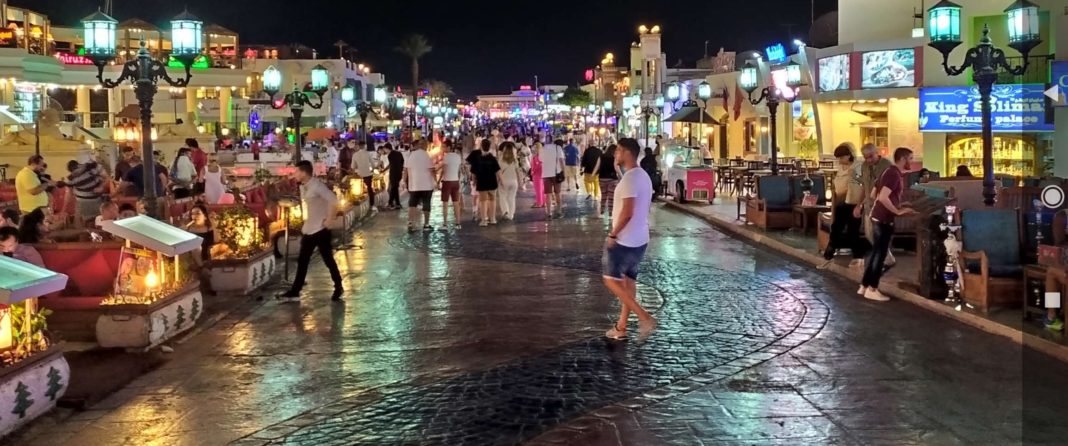Local Egyptian sources have said that new cases of coronavirus have appeared in the Egyptian city of Sharm el-Sheikh, causing panic in this important tourist city which prompted Egyptian authorities to block access to the internet in an attempt to prevent people talking about it. According to those sources, among the cases are Italian tourists who arrived in the city more than a week ago. The sources added that Italian tourists were isolated inside a hotel and checks are being made on the entire tourist group to know the exact numbers that are infected. The Egyptian authorities fear that publishing this news means tourists will stop coming to Egypt, especially as the numbers of tourists have already begun to decline. But observers point out that there is another reason, which is that this news provokes widespread public anger over the Egyptian regime’s handling of the coronavirus crisis, as it allowed Italian tourists to enter Egypt despite the spread of COVID-19 in Italy. Italy is the country with the highest number of coronavirus cases in Europe, the second highest in the world.
A state of anxiety prevails in Sharm el-Sheikh considering no one knows where the people who are infected visited, or who has been in contact with them. Authorities did not inform anyone of their names, release pictures of them, or divulge information on the places they have visited. Many workers in the city expect that the Egyptian authorities will isolate dozens of tourists and workers in the tourism sector in the coming hours, to prevent the transmission of infection. When a number of workers in the city started to publish the news, internet users reported not being able to get online. Observers have said that authorities do not want people to know what is happening as it will have a significant impact on tourism revenues. There are fears of a devastating impact of the virus on the tourism sector in Egypt, which is vital for the economy, especially after the emergence of several cases in Luxor in the south of the country. South Sinai governorate, where Sharm el-Sheikh is located, is the biggest tourism hub in Egypt. Sharm el-Sheikh is not considered the first tourist city to be attacked by the coronavirus. The Middle East Eye has revealed that “the city of Luxor in southern Egypt is witnessing a semi-closed state since last Monday, where all visits to antiquities, cultural events, and balloon trips were cancelled after the appearance of the coronavirus.”
The horror in Luxor started after it was confirmed that 45 foreign tourists were infected with the coronavirus in addition to the crew on a Nile cruise ship. The Egyptian army transferred the infected to an isolation hospital located in Marsa Matruh. Specialised medical teams arrived in Luxor from Cairo and Qena and visited hotel restaurants and cruise ships in the area to take samples and conduct random tests for workers and tourists. The arrival of health staff and the cancellation of tourist activities meant many tourists left the city and headed to Cairo or the Red Sea resorts of Hurghada and Sharm el-Sheikh. Observers accuse the Egyptian authorities of having sought to reap the benefits of the winter tourism season and risking the health of Egyptians, which caused the spread of coronavirus. The United States, France, Canada, and other countries have detected that a number of people have become infected with the coronavirus after returning from trips to Egypt.
The Egyptian Minister of Education, Tarek Shawky, has admitted that the Egyptian government did not want to suspend studies and close schools in the country during the past few days, to avoid negatively affecting tourism. The Egyptian authorities say that there are 126 cases of coronavirus in Egypt, but journalists and activists say that the announced numbers are much lower than the real numbers. A team of researchers in infectious diseases at the Canadian University of Toronto said that the estimates of the number of people infected with coronavirus in Egypt ranges between 6,000 and 45,000. Public health data and news reports showed that at least 97 foreigners who visited Egypt since mid-February showed symptoms or were diagnosed with COVID-19 upon their return home. Most of the infected people spent time on Nile cruises, which is believed to be the source of the outbreak in Luxor, southern Egypt, which is a tourist hotspot. Infectious disease specialists from the University of Toronto, who studied the discrepancy between official and likely infection rates in places such as Iran, gave a grim picture of the possible spread of the virus in Egypt. Using a combination of flight data, travel data and injury rates, they said the size of the catastrophe in Egypt was estimated at 19,310 infected in the country.









